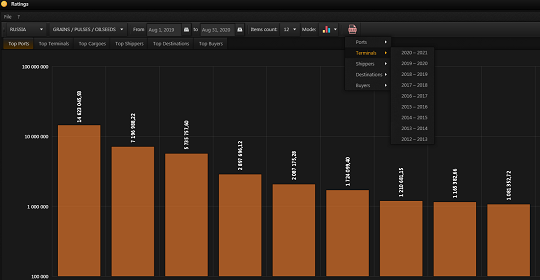The total volume of illegal exports can reach up to 2 million tons per year.
Of these, 500 thousand tons are processed in Kazakhstan, the rest are sold to neighboring countries.
According to Taisiya Kolegova, vice-president of the Union of Grain Processors of Kazakhstan, this situation becomes possible due to the «cooperation» of Russian and Kazakh producers and traders.
This state of affairs leads to very negative consequences.
— The budgets (both Russian and Kazakhstani) receive less taxes. The customs services of the Russian Federation are not even aware that millions of tons of wheat have been sold for export. Likewise, the budget of Kazakhstan does not receive a 12% tax (import VAT), which is tens of billions of tenge per year.
— The grain purchased in Russia is transported within Kazakhstan as its own, at preferential railway tariffs. This means that the carrier receives less money.
— Cheap imports endanger their own Kazakhstani producers. Their grain is not in demand, it loses its competitiveness.
— Since the imported grain, according to the documents, is considered to be grown in Kazakhstan, the data on real crops both in this country and in the Russian Federation are distorted.
— Russian processing enterprises do not have enough grain. For example, from the Omsk region annually up to 200 thousand tons of grain go to Kazakhstan.
— The decline in the reputation of Kazakhstani farmers. «Gray traders» buy the worst grain in Russia — fodder, then it is sent to other countries as Kazakh.
How to stop illegal exports?
As you can see, this business has many negative consequences. What can you do to interrupt it?
Most importantly, stricter laws are needed.
According to the internal rules of the Eurasian Economic Union (EAEU), cargo turnover between its member countries occurs without customs checks, without control.
“Hundreds of thousands of tons come in according to documents like air. An empty KamAZ crossed the border, drove into the Russian Federation and returned to Kazakhstan «empty» according to the documents. According to the documents, but in fact he is carrying Russian wheat! ”, — says Taisiya Kolegova.
The customs services, the FSB, the traffic police could ask questions to the truck drivers, but for some reason they don’t.
Almost all wheat is transported to Kazakhstan by road — it is very difficult to work illegally through Russian Railways.
The situation may also be influenced by the difficult political situation in Afghanistan — this is one of the main markets for the final sale of Russian grain, along with Uzbekistan and Tajikistan.
If banks refuse to make bank transfers to Afghanistan, trade with that country could be at risk.
However, the main thing that can reduce the scale of grain smuggling is strict laws, increased control, as well as the responsibility of Russian producers themselves, who are often not averse to getting cash from “gray traders” by loading a car with wheat without any documents.

